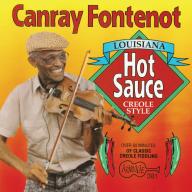Fontenot, who grew up working on a family farm, inherited his musical skills from his parents, who played accordion. He first played a cigar-box fiddle that had strings taken off the screen door of his home. His bow was made from the branches of pear trees and sewing thread. Although his mother never played in public, his father, Adam Fontenot (Nonc Adam), was well known throughout the Cajun community of southwest Louisiana. Fontenot later recorded nearly all the songs in his father's repertoire.
In 1937, Fontenot was invited by Amade Ardoin to travel to New York and play on his recording of "Les Portes de la Prison." Fontenot's mother, however, refused to let him go, telling him he was too young to go to New York. After playing with several string bands, Fontenot joined with accordion player Alphonse Bois-Sec Ardoin to form a duo in the mid-'40s. The two musicians continued to play together for more than 40 years. Fontenot and Ardoin made their debut outside of Louisiana in 1966, performing at the Newport Folk Festival. Five tunes from their performance were included on the 1975 album, Louisiana Cajun French Music from the Southwest Prairies.
Fontenot had a long association with Arhoolie Records. In 1970, the label reissued Les Blues de Bayou, which Fontenot and Bois-Sec had initially released on Melodian. Several tracks on the album were added to new recordings from 1983 and released as La Musique Creole. Fontenot's last album for Arhoolie, Louisiana Hot Sauce, Creole Style, released in 1993, featured additional tracks from Les Blues de Bayou and four tunes recorded with Beausoleil in 1985. Fontenot was also featured in #J'ai Ete au Bal, a film produced by Chris Strachwitz and Cajun historian Les Blank. Fontenot balanced his musical career by working as a sharecropper for several years and in a hardware store, helping to send four of his six children through college and his daughter through law school. Fontenot died in 1995 after a long bout with cancer. ~ Craig Harris, Rovi












